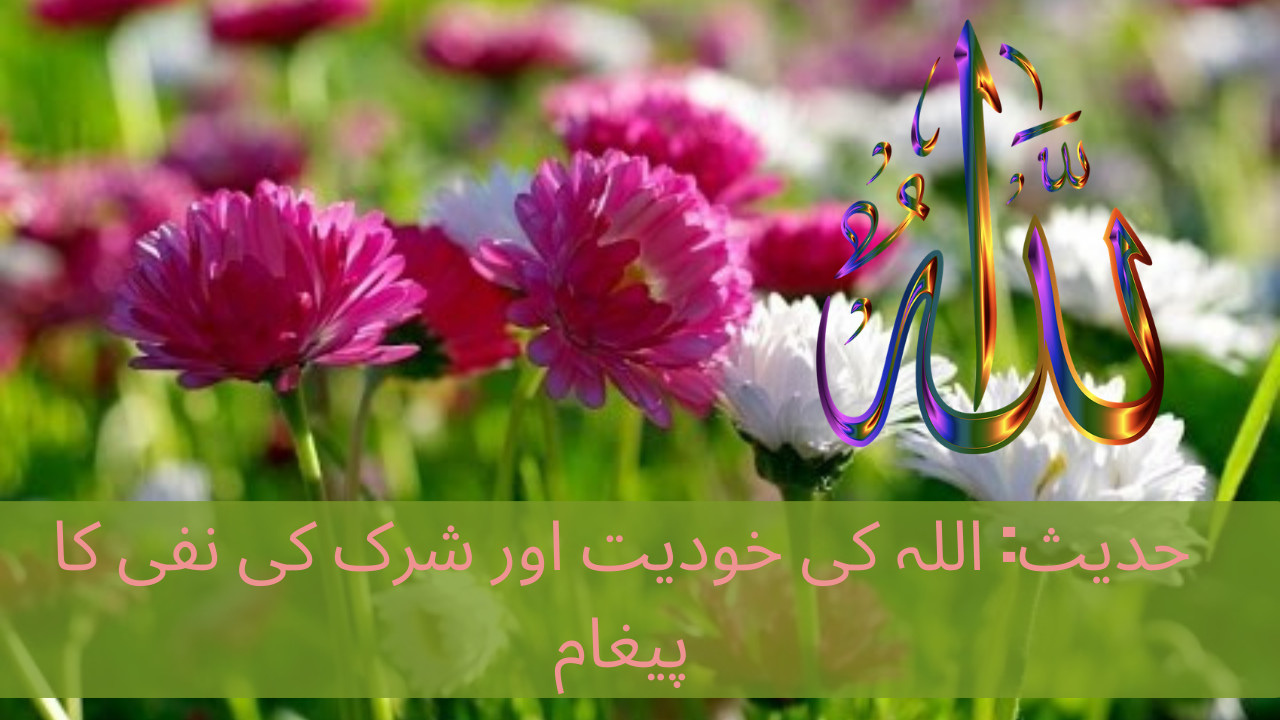Allah K Wahdaniyat K Baray May Rasool Ullah Ka Hadees

Allah K Wahdaniyat K Baray May Rasool Ullah Ka Hadees
Hadees Of The Rasool Ullah
رواه مسلم (وكذلك ابن ماجه)
About This Hadees In English, Urdu And Araibic
English
Narrated by Abu Huraira (may Allah be pleased with him): The Messenger of Allah (peace be upon him) said: “Allah, the Blessed and Exalted, says: ‘I am the Most Self-Sufficient (free of any need or partners). Whoever performs an act in which he associates anyone else with Me, I shall abandon him and his association.'”
Explanation in English
This Hadith emphasizes the absolute oneness and self-sufficiency of Allah (Tawhid). Allah makes it clear that He is free from any need or partnership with others. If someone performs an act of worship or devotion and associates partners with Allah in that act, Allah will reject both the act and the person responsible for it. This underscores the importance of sincere and pure monotheism in Islamic faith, where worship and devotion should be directed to Allah alone, without any partners.
In Urdu
حضرت ابو ہریرہ (رضی اللہ تعالی عنہ) سے روایت ہے کہ پیغمبر محمد صلی اللہ علیہ وآلہ وسلم نے فرمایا: “اللہ تعالی کہتے ہیں: ‘میں سب سے زیادہ غنی ہوں (کسی قسم کی ضرورتوں سے پاک ہوں اور کسی کے شریکوں کے بغیر ہوں)۔ جو شخص کسی کارروائی کو کرے اور اس کارروائی میں میرے ساتھ کسی کو شریک بنا لے، میں اُسے اور اس کے شریکوں کو چھوڑ دوں گا۔’
Arabic
عَنْ أَبِي هُرَيْرَةَ رَضِيَ اللَّهُ عَنْهُ، قَالَ: قَالَ رَسُولُ اللَّهِ صَلَّى اللَّهُ عَلَيْهِ وَسَلَّمَ: “قَالَ اللَّهُ تَبَارَكَ وَتَعَالَى: أَنَا أَغْنَى الشُّرَكَاءِ عَنْ الشِّرْكِ؛ مَنْ عَمِلَ عَمَلًا أَشْرَكَ مَعِي غَيْرِي، تَرَكْتُهُ وَشِرْكَهُ”.
Explanation in Arabic
هذا الحديث يسلط الضوء على توحيد الله الذي يعني الإيمان بوحدانية الله واستقلاله عن الجميع. يوضح الله تعالى أنه ليس بحاجة إلى أي شيء ولا يشرك أحداً معه في شركاء. إذا قام شخص بفعل عبادي وشرك شركاء مع الله في هذا الفعل، سيتم رفض هذا الفعل وسيترك الشخص المسؤول عنه. هذا يؤكد على أهمية التوحيد الصادق في الإيمان الإسلامي، حيث يجب توجيه العبادة والتفاني إلى الله وحده بدون شركاء.
Benefits Of This Hadees
- Monotheism (Tawhid): This Hadith reaffirms the fundamental concept of monotheism in Islam. It emphasizes that Allah is self-sufficient and does not need any partners or associates. Believers are reminded of the importance of maintaining pure monotheistic beliefs.
- Avoiding Shirk (Associating Partners with Allah): The Hadith serves as a stern warning against shirk, which is the gravest sin in Islam. Believers are reminded of the importance of worshiping Allah alone and not associating partners with Him.
- Sincerity in Worship: Believers are encouraged to perform acts of worship with sincerity (ikhlas) and devotion. When they understand that Allah is self-sufficient and doesn’t need any partners, it motivates them to worship Him with pure intentions.
- Rejection of False Beliefs: The Hadith rejects any false beliefs or practices that involve associating partners with Allah. It guides believers to adhere to the true monotheistic faith of Islam.
- Strengthening Faith: Understanding Allah’s self-sufficiency and the rejection of partners in worship can strengthen a believer’s faith and resolve to worship Allah alone.
- Deterrence from Polytheism: This Hadith acts as a deterrent against polytheistic practices and beliefs. Believers are reminded of the consequences of associating partners with Allah.
- Theological Clarity: It provides theological clarity about the nature of Allah, highlighting His absolute independence and uniqueness.
- Spiritual Growth: The Hadith encourages believers to deepen their spirituality by recognizing Allah’s sole authority and avoiding any form of shirk.
- Guidance for Daily Life: Believers can apply the principles from this Hadith in their daily lives by ensuring that their actions and beliefs align with the monotheistic principles of Islam.
- Unity of Belief: Understanding the rejection of partners with Allah reinforces the unity of belief among Muslims, emphasizing the oneness of Allah.
In summary, this Hadith serves as a reminder of the core monotheistic beliefs in Islam and encourages believers to worship Allah with sincerity, reject shirk, and strengthen their faith in the self-sufficient and unique nature of Allah.





